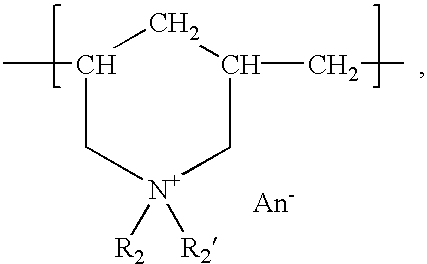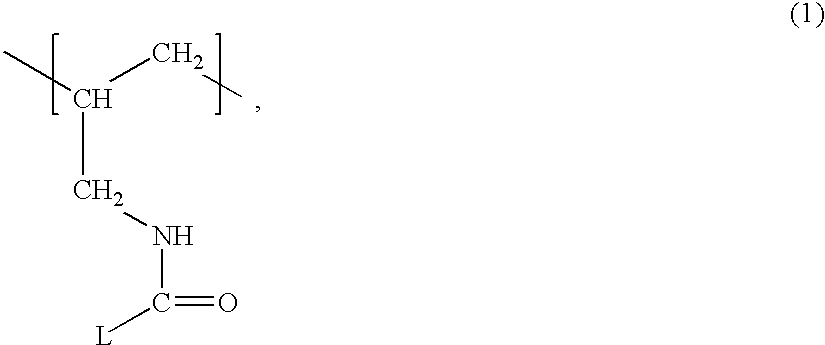Polymeric articles having a lubricious coating and method for making the same
a technology of lubricating coating and polymer material, which is applied in the field of polymer material having a lubricating coating and making the same, can solve the problems of high oxygen permeability, high capital investment in plasma processing equipment, and increase capital and production costs, so as to reduce bacterial adhesion and high surface hydrophilicity and lubricity
- Summary
- Abstract
- Description
- Claims
- Application Information
AI Technical Summary
Benefits of technology
Problems solved by technology
Method used
Image
Examples
example 1
Contact Lenses Having an LbL Coating with a Capping Layer of Polyvinylpyrrolidone (PVP)
[0127]Polyacrylic acid (PAA) solution: A solution of polyacrylic acid having a molecular weight of about 90,000, from PolyScience, is prepared by dissolving a suitable amount of the material in water to form a 0.001M PAA solution. The PAA concentration is calculated based on the repeating unit in PAA. Once dissolved, the pH of the polyanionic PAA solution is adjusted by adding 1N hydrochloric acid until the pH is about 2.5.
Poly(allylamine hydrochloride) (PAH) solution: A solution of poly(allylamine hydrochloride) (PAH) having a molecular weight of about 70,000, from Aldrich, is prepared by dissolving a suitable amount of the material in water to form a 0.001M PAH solution. The concentration is calculated based on the molecular weight of repeating unit in PAH. Thereafter, the pH of the polycationic PAH solution is measured and recorded. The pH is around 4.5
Polyvinylpyrrolidone (PVP) solution: A sol...
example 2
Contact Lenses Having Multiple Bilayers of Polyamidoamine (PAMAM) Dendrimer / polyacrylamide-co-poly(Acrylic Acid) Copolymer (PAAm-co-PAA) Thereon
PAA and PAH solutions: PAA and PAH solutions are prepared as described in Example 1.
[0128]Starburst PAMAM dendrimer solution: A solution of Starburst™ PAMAM dendrimer (from Dentritech, Inc) having generation 4.0 is prepared by dissolving a suitable amount of the material in water to form a 0.001M PAMAM solution. The PAMAM dendrimer concentration is calculated based on the average molecular weight of dendrimer-forming unit per amino group. Once dissolved, the pH of the PAMAM solution is adjusted by adding 1N hydrochloric acid until a desired pH.
PAAm-co-PAA solution: A solution of PAAm-co-PAA copolymer (80% PAAm ad 20% PAA, from Advanced Research Unit, Ciba Vision Switzerland) is prepared by dissolving a suitable amount of the material in water to form a 0.001M solution. The PAAm-co-PAA copolymer concentration is calculated based on the molecu...
example 3
Contact Lenses Having Multiple Bilayers of Protasan / PAAm-co-PAA Thereon
PAA and PAAm-co-PAA solutions: PAA and PAAm-co-PAA solutions are prepared as described in Example 2.
[0129]Protasan solution: Protasan® is water-soluble chitosan manufactured by Pronova Biomedical. The Molecular weight ranges from about 110,000 to 460,000. A solution of Protasan is prepared by dissolving a suitable amount of the material in water to form a 0.001M Protasan® solution. The concentration is calculated based on the molecular weight of the repeating unit. Once dissolved, the pH of the solution is adjusted by adding 1N hydrochloric acid until a desired pH
Coating: A coating having bilayers of Protasan® / PAAm-co-PAA is formed on a soft contact lens made of a fluorosiloxane hydrogel material, lotrafilcori A (CIBA Vision). The contact lens is first dipped in the PAA solution (0.001M, pH2.5) for 30 minutes, then dipped in the Protasan solution (0.001M, pH 3.5, or 4.4, or 5.5) for 5 minutes, rinsed with ultra-p...
PUM
| Property | Measurement | Unit |
|---|---|---|
| contact angle | aaaaa | aaaaa |
| molecular weights | aaaaa | aaaaa |
| thickness | aaaaa | aaaaa |
Abstract
Description
Claims
Application Information
 Login to View More
Login to View More - R&D
- Intellectual Property
- Life Sciences
- Materials
- Tech Scout
- Unparalleled Data Quality
- Higher Quality Content
- 60% Fewer Hallucinations
Browse by: Latest US Patents, China's latest patents, Technical Efficacy Thesaurus, Application Domain, Technology Topic, Popular Technical Reports.
© 2025 PatSnap. All rights reserved.Legal|Privacy policy|Modern Slavery Act Transparency Statement|Sitemap|About US| Contact US: help@patsnap.com


